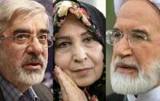November 15-2013

As of Tuesday, Mehdi Karrubi, Mir-Hossain Musavi and Zahra Rahnavard had spent 1,000 days under house arrest—and Tehran prosecutor Gholam-Hossain Mohseni-Ejai says that isn’t about to change.
Ejai told a news conference Tuesday, “These individuals have committed an offence, and the harm was suffered by the system, the country and the people.”
He said, “Those who have been put under house arrest were not protesters, their actions were criminal. They have acted against the people, and in law it has been stated how we have to deal with those who commit a crime.”
But the three have never been tried by a court, let alone even charged.
Ejai said: “About these particular people, certain decisions were made and there has been no change in their punishment.” The national police chief said a year ago that the Supreme Leader himself ordered the house arrests.
Ejai’s comments appeared to bury any hope of finding some compromise by which the trio might be freed. In his presidential campaign, Hassan Rohani indicated he wanted to see the three freed and there has been much talk about securing their release since his inauguration. But conservatives seem to have dug in their heels.
Karrubi and Musavi were Reformist candidates in the 2009 presidential election; Rahnavard is an educator and political activist—and Musavi’s wife.
As of Tuesday, November 12, the three had spent 1,000 days under house arrest without charge or trial. No governmental agency or body has expressly accepted responsibility for their detention or brought any charges against them.
“The continuing house arrest and detention of these opposition figures is indicative of the continued repression and intolerance of government authorities toward dissent in Iran,” said Sarah Leah Whitson, Middle East director at Human Rights Watch. “Officials’ claims that there are no political prisoners in Iran flies in the face of the brutal reality of Iran’s still-jailed political leaders and activists.”
Officials placed the two presidential candidates and their wives under house arrest on February 14, 2011, in response to their call for demonstrations in support of popular uprisings across the Middle East. Officials later released Fatemeh Karrubi from house arrest.
On October 30, the Mehr news agency reported that Mostafa Pur-Mohammadi, Rohani’s pick for Justice Minister, was asked if the Rohani Administration would set up a special committee to examine releasing the three, as was discussed in the campaign. Pur-Mohammadi said, “The government will not interfere in these matters.”
A few weeks earlier, Pur-Mohammadi had told reporters the Supreme National Security Council, chaired by Rohani, would review the detentions. Four days later, a Judiciary spokesman denied that would happen.
Senior officials have given varied accounts of the rationale for the detentions. In November 2011, Mohammad-Javad Larijani, head of the High Council for Human Rights, said the detainees had engaged in “illegal activities” and incited violence. He also said that Iran’s Judiciary would not place anyone under house arrest without trial and court order, and that the public would soon learn of the charges against the detainees.
More than a year later, on December 25, 2012, when officials still had not brought charges against any of the three, national police chief Esmail Ahmadi-Moqaddam said Supreme Leader Ali Khamenehi had himself approved the detentions in advance.
